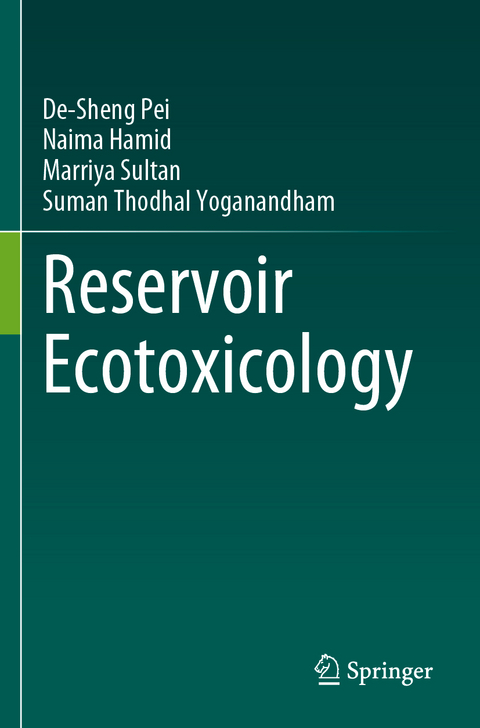
Reservoir Ecotoxicology
Springer International Publishing (Verlag)
978-3-031-26346-0 (ISBN)
Reservoir construction is the key strategy for water resource management. In recent years, the migration of pollutants and their transformation into the reservoir ecosystem has become a global problem. Intensified anthropogenic activities and unsustainable practices have amplified the pollutant levels in the reservoir. Therefore, this book intends to highlight environmental characteristics of the reservoir, study methods of ecotoxicology, and mechanistic toxicogenetic pathways of pollutants in the reservoir. Adverse outcome pathway (AOPs) model is used to elucidate toxicological effects of reservoir pollutants. Moreover, ecological and human health risks of the Three Gorges Reservoir (TGR), the largest power generation reservoir on earth, and its pollution status are also discussed.
Dr. De-Sheng Pei is a professor at Chongqing Medical University, China. Dr. Pei got his Ph.D. degree from Institute of Hydrobiology (IHB), Chinese Academy of Sciences (CAS) in 2003. From Jun 2006 to Feb 2009, Dr. Pei worked at IHB (CAS) as an assistant professor. From Feb. 2009 to Feb. 2011, as a senior postdoctoral research associate, Dr. Pei concentrated his study on the mechanisms of DNA damage and repair at Northeastern University (U.S.A). Thereafter, Dr. Pei worked as a Research Fellow at Dana-Farber Cancer Institute/Harvard Medical School (U.S.A) to study the mechanism of carcinogenesis of neuroblastoma from Feb. 2011 to Feb. 2013. In August 2012, Dr. Pei got the professor position at Chongqing Institute of Green and Intelligent Technology (CIGIT), Chinese Academy of Sciences (CAS). From Feb. 2012 to Sept. 2021, he led the Research Center for Environment and Health (RCEH) at CIGIT. From Sept. 2021 till now, he was introduced to Chongqing Medical University as a distinguished professor of excellent high-level talent. His discoveries have been published in more than 120 journals, including Cancer Cell, Nucleic Acids Research, Brain, PLOS Genetics, Biomaterials, Journal of Hazardous Materials, Environmental Pollution, etc.
Dr. Naima Hamid joined Lahore College for Women University as an Assistant Professor in 2021. She completed doctoral studies at Chongqing Institute of Green and Intelligent Technology, University of Chinese Academy of Sciences (UCAS) in 2020. She was awarded the Chinese Academy of Sciences-The World Academy of Sciences (CAS-TWAS) presidential scholarship from 2017-2020. She worked in the field of ecotoxicology to establish baseline data about emerging pollutants and associated health risks in Pakistan. She contributed to an e-book on "Marine Ecology" under Bentham Science Publishers. Throughout her research career, she published 25 international research articles. She remained associated with the Ministry of Climate Change, Pakistan. As a research scholar, she joined Pakistan Meteorological Department with the Climate Change research group. Her research interests are focused on ecological risk assessment of hazardous chemicals in environmental matrices. Presently, she is endeavoring the development of integrated monitoring methods of pollutants with their toxicological mechanisms.
Ms. Marriya Sultan is currently enrolled in a Ph. D. program in environmental sciences at Chongqing Institute of Green and Intelligent Technology, Chinese Academy of Sciences under a CAS-TWAS fellowship 2019. Previously, she obtained her M.Phil degree in environmental sciences from Quaid-I-Azam University, Islamabad Pakistan. Currently, she is working on a Ph.D. project, entitled "Co-existing characteristics of microplastics and DEHP in the Three Gorges Reservoir Area and mechanism of compound reproductive toxicity on zebrafish model", under the supervision of Prof. & Dr. De-Sheng Pei. Her expertise includes the characterization of organic and inorganic environmental pollutants (exposure routes, dose-response, and mode of action), rigorous evaluations of contamination using novel techniques, and analysis of environmental pollutants data.
Dr. Thodhal Yoganandham Suman got his Ph.D. degree from Sathyabama University in 2017. From Jun 2014 to Dec 2018, Dr. T.Y.Suman worked at the Center of Ocean Research in Sathyabama University as a Senior Scientific Assistant. From Dec. 2018 to Mar. 2021, as a Postdoctoral research fellow, Dr. T.Y.Suman concentrated his study on the characterization of marine plastic debris and the effect of microplastics on aquatic organisms at Henan Normal University & Chongqing Institute of Green and Intelligent Technology (China). He currently works as a postdoctoral research fellow for enviro
Part I. Introduction.- An Introduction to Reservoir Ecotoxicology.- Part II. Environmental Characteristics in Reservoir Ecosystems.- Characterization of Reservoir Ecosystem.- Main Sources and Distribution of Pollutants in the Reservoir.- Migration and Transformation of Pollutants in the Reservoir.- Harmful Algal Bloom in the Reservoir.- Microplastics Pollution in the Reservoir: Occurrence, Extraction, and Characterization.- Distribution of Microorganisms in the Reservoir.- Part III. Study Methods of Ecotoxicology in the Reservoir.- Ecotoxicity Test Methods of Primary Producers in the Reservoir.- Ecotoxicology Methods of Reservoir Water Using Invertebrates.- Ecotoxicology Methods of Reservoir Water Using Fish.- Ecotoxicology Methodology of Sediment Toxicity in the Reservoir.- Mesocosm Study in the Reservoir Ecosystem.- Part IV. Ecotoxicological Effects and Mechanism of Pollutants in the Reservoir.- Molecular Toxicity Mechanism of Heavy Metals in the Reservoir.- Molecular Toxicity Mechanism of Persistent Organic Pollutants (Pops) in the Reservoir.- Molecular Toxicity Mechanism of Microplastics in the Reservoir.- Molecular Toxicity Mechanism of Plasticizers in the Reservoir.- Molecular Toxicity Mechanism of PPCPs in the Reservoir.- Adverse Outcome Pathways (AOPs) of Pollutants in the Reservoir.- Invasive Alien Species Problem in the Reservoir.- Part V. Conclusions.- Final Thoughts and Concluding Remarks.
| Erscheinungsdatum | 12.04.2024 |
|---|---|
| Zusatzinfo | XXXI, 234 p. 31 illus., 28 illus. in color. |
| Verlagsort | Cham |
| Sprache | englisch |
| Maße | 155 x 235 mm |
| Themenwelt | Naturwissenschaften ► Biologie ► Ökologie / Naturschutz |
| Schlagworte | ecotoxicology • Pollutants • Reservoir Construction • Reservoir Ecosystem • Three Gorges Reservoir • Water resource management |
| ISBN-10 | 3-031-26346-4 / 3031263464 |
| ISBN-13 | 978-3-031-26346-0 / 9783031263460 |
| Zustand | Neuware |
| Haben Sie eine Frage zum Produkt? |
aus dem Bereich


